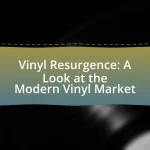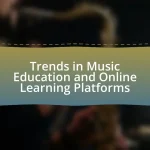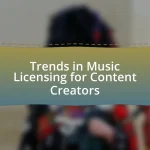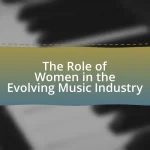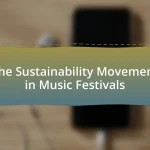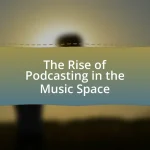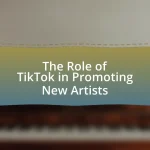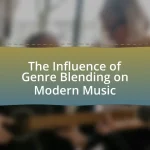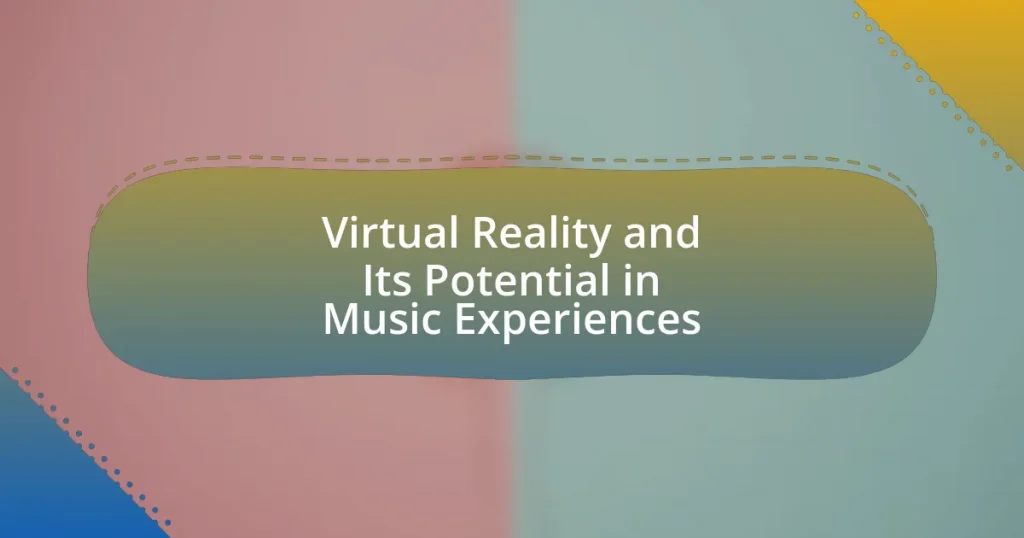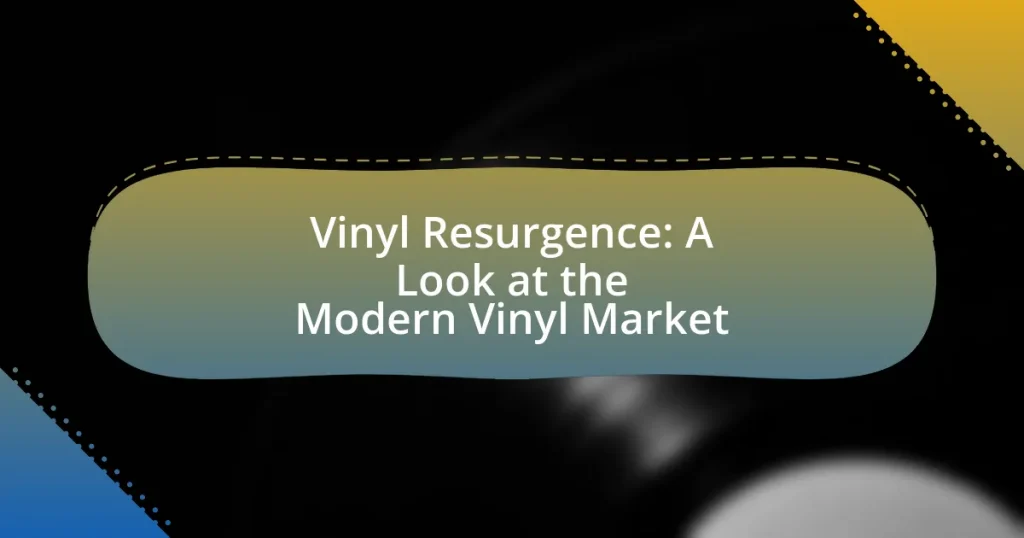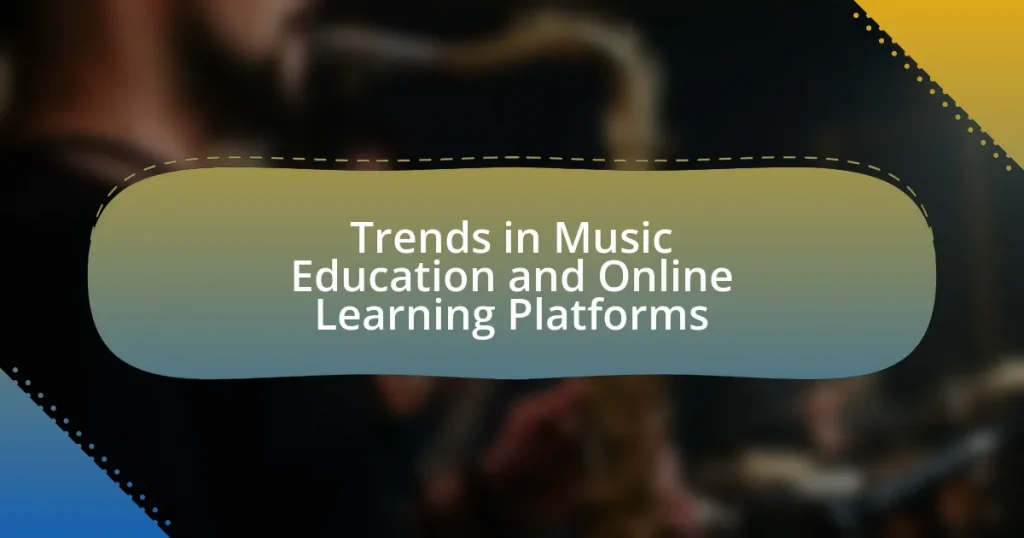The rise of podcasting in the music space highlights the growing integration of podcasts as a platform for music-related content, driven by advancements in streaming technology and audience engagement. With 80% of podcast listeners also using music streaming services, podcasts have evolved from simple commentary to dynamic platforms for artist promotion, storytelling, and music discovery. Key trends include the demand for on-demand audio, niche audience targeting, and the impact of technological innovations on content creation and distribution. Challenges such as market saturation, monetization difficulties, and copyright issues also shape the landscape, while emerging technologies promise to further enhance the podcasting experience for both creators and listeners.
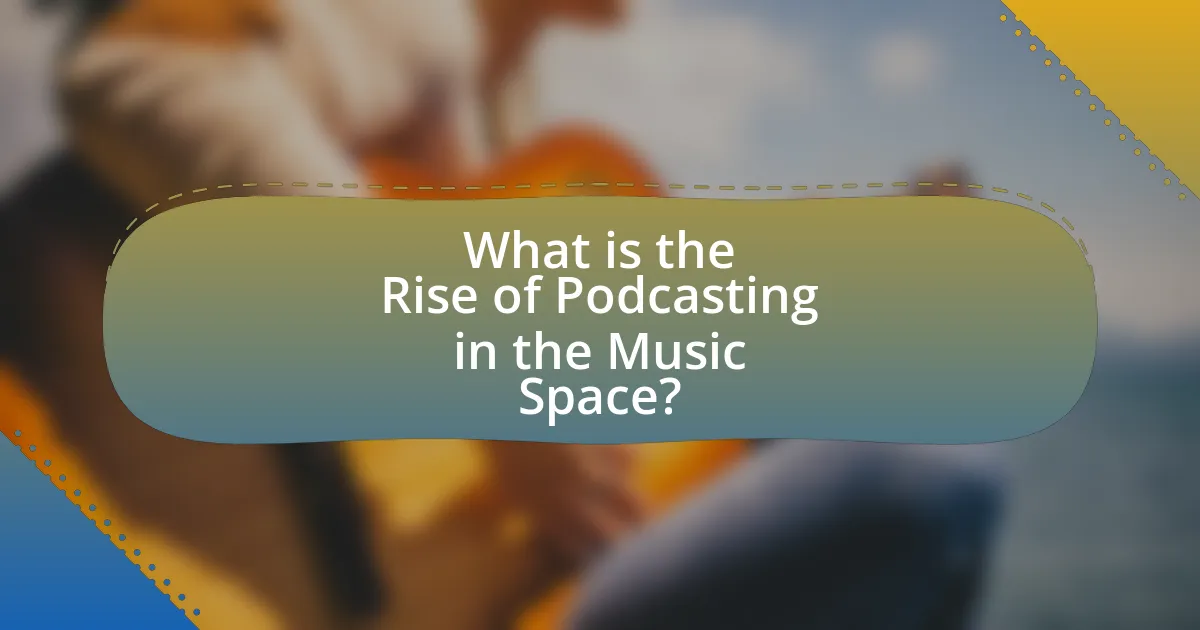
What is the Rise of Podcasting in the Music Space?
The rise of podcasting in the music space refers to the increasing popularity and integration of podcasts as a medium for music-related content. This trend has been fueled by the growth of streaming platforms, with a reported 80% of podcast listeners also engaging with music streaming services, according to a 2021 study by Edison Research. Podcasts provide artists and music enthusiasts a platform to discuss music trends, share stories, and promote new releases, enhancing audience engagement. Additionally, the accessibility of podcasting technology has allowed independent artists to reach wider audiences, contributing to the diversification of music content available to listeners.
How has podcasting evolved within the music industry?
Podcasting has evolved within the music industry by becoming a vital platform for artists to connect with fans, promote their work, and share their stories. Initially, podcasts served primarily as a medium for music commentary and interviews, but they have since expanded to include artist-led shows, music discovery platforms, and behind-the-scenes content. According to a 2021 report by Edison Research, 41% of podcast listeners are more likely to discover new music through podcasts, highlighting their role in music promotion. Additionally, major artists like Joe Rogan and Dax Shepard have leveraged podcasting to create personal brands, further integrating the medium into the music landscape. This evolution reflects a shift towards more direct and personal engagement between artists and audiences, enhancing the overall music experience.
What historical factors contributed to the growth of music podcasts?
The growth of music podcasts has been significantly influenced by the advent of digital technology and the rise of streaming services. The introduction of the iPod in 2001 and subsequent advancements in mobile technology facilitated easy access to audio content, allowing users to listen to music and podcasts on-the-go. Additionally, the proliferation of high-speed internet and the establishment of platforms like Apple Podcasts and Spotify in the 2010s provided a dedicated space for music-related content, further driving listener engagement. According to a 2021 report by Edison Research, 41% of Americans aged 12 and older have listened to a podcast, highlighting the increasing popularity of the medium. These technological advancements and the growing demand for on-demand audio content have collectively contributed to the rise of music podcasts.
How do technological advancements influence music podcasting?
Technological advancements significantly influence music podcasting by enhancing production quality, distribution efficiency, and audience engagement. Innovations such as high-quality recording equipment and editing software allow creators to produce professional-sounding content, which attracts more listeners. Additionally, platforms like Spotify and Apple Podcasts utilize algorithms to recommend shows, increasing discoverability and listener retention. According to a 2021 report by Edison Research, 41% of Americans aged 12 and older have listened to a podcast in the past month, highlighting the growing popularity driven by these technological improvements.
Why is podcasting becoming a popular medium for music enthusiasts?
Podcasting is becoming a popular medium for music enthusiasts due to its accessibility and the ability to provide in-depth discussions about music. This format allows listeners to explore various genres, artist interviews, and music history in a convenient way, often while multitasking. According to a 2022 report by Edison Research, 41% of Americans aged 12 and older have listened to a podcast in the past month, indicating a growing trend in audio content consumption. Additionally, platforms like Spotify and Apple Podcasts have made it easier for users to discover music-related content, further driving the popularity of podcasts among music fans.
What unique features do music podcasts offer compared to traditional media?
Music podcasts offer unique features such as personalized content, on-demand accessibility, and niche community engagement that traditional media cannot match. Unlike traditional radio or television, music podcasts allow listeners to choose specific genres, artists, or themes, tailoring their experience to individual preferences. Additionally, music podcasts are available anytime and anywhere, enabling users to listen at their convenience, which contrasts with the scheduled programming of traditional media. Furthermore, music podcasts often foster a sense of community through interactive elements like listener feedback and social media engagement, creating a more intimate connection between hosts and audiences. These features collectively enhance the listener’s experience, making music podcasts a distinct medium in the audio landscape.
How do music podcasts enhance listener engagement and community building?
Music podcasts enhance listener engagement and community building by fostering interactive discussions and creating a sense of belonging among fans. They often feature listener feedback, Q&A segments, and social media integration, which encourage audience participation. For instance, a study by Edison Research found that 54% of podcast listeners feel a stronger connection to the content when they can interact with hosts and other listeners. This interaction not only deepens engagement but also cultivates a community where fans share experiences and insights, reinforcing their connection to the music and each other.
What are the key trends driving the rise of podcasting in music?
The key trends driving the rise of podcasting in music include the increasing demand for on-demand audio content, the growth of niche audiences, and the integration of music with storytelling. The demand for on-demand audio content has surged, with statistics showing that over 50% of the U.S. population has listened to a podcast, indicating a shift in how audiences consume media. Additionally, niche audiences are being targeted effectively, as podcasts allow for specialized content that caters to specific genres or artist communities, enhancing listener engagement. Furthermore, the integration of music with storytelling in podcasts creates a unique listening experience, as evidenced by successful formats that combine interviews with artists and curated music selections, appealing to both music lovers and casual listeners.
How are artists leveraging podcasts for promotion and storytelling?
Artists are leveraging podcasts for promotion and storytelling by creating engaging content that connects with their audience on a personal level. Through podcasts, musicians share their creative processes, discuss their inspirations, and provide behind-the-scenes insights into their work, which fosters a deeper connection with fans. For instance, artists like Billie Eilish and Dax Shepard have utilized their podcasts to discuss their music and personal experiences, effectively promoting their albums while enhancing their storytelling. This approach not only increases visibility but also builds a loyal listener base, as evidenced by the growing number of music-related podcasts, which reached over 1.5 million in 2023, indicating a significant trend in the industry.
What role do streaming platforms play in the podcasting landscape?
Streaming platforms serve as crucial distribution channels in the podcasting landscape, significantly enhancing accessibility and audience reach. By integrating podcasts into their existing services, platforms like Spotify and Apple Music have expanded their content offerings, attracting a diverse listener base. For instance, Spotify reported that podcast consumption on its platform increased by 200% in 2020, illustrating the growing importance of streaming services in promoting podcast content. Additionally, these platforms often provide analytics and monetization options for creators, further incentivizing the production of high-quality podcasts.

What challenges does the music podcasting industry face?
The music podcasting industry faces several significant challenges, including market saturation, monetization difficulties, and content differentiation. Market saturation has led to an overwhelming number of podcasts, making it hard for new entrants to gain visibility; as of 2023, there are over 2 million podcasts available, with a substantial portion focused on music. Monetization remains a critical issue, as many creators struggle to secure sponsorships or generate revenue through listener support, with only about 10% of podcasters reporting substantial income. Additionally, content differentiation is vital, as podcasts must offer unique perspectives or formats to stand out in a crowded field, which can be challenging given the vast array of existing content.
How do copyright issues impact music podcasts?
Copyright issues significantly impact music podcasts by limiting the use of copyrighted music, which can lead to legal challenges and potential financial penalties for podcasters. Music podcasts often require licenses to use songs, and failure to obtain these licenses can result in takedown notices or lawsuits from copyright holders. For instance, the Digital Millennium Copyright Act (DMCA) allows copyright owners to request the removal of infringing content, which can disrupt podcast distribution and audience reach. Additionally, the costs associated with licensing music can deter creators from including popular tracks, thereby affecting the overall quality and appeal of the podcast.
What are the legal considerations for music content in podcasts?
The legal considerations for music content in podcasts primarily involve copyright law, licensing requirements, and fair use provisions. Copyright law protects the rights of music creators, meaning that podcasters must obtain permission or licenses to use copyrighted music. This can include obtaining a mechanical license for reproducing music, a synchronization license for pairing music with audio, or a public performance license for broadcasting music. Fair use may apply in limited circumstances, allowing for the use of music without permission, but this is often a complex legal area and not guaranteed. For instance, the U.S. Copyright Office outlines that fair use is determined by factors such as the purpose of use, the nature of the copyrighted work, the amount used, and the effect on the market value of the original work. Therefore, podcasters must navigate these legal frameworks carefully to avoid infringement and potential legal consequences.
How can podcasters navigate licensing agreements effectively?
Podcasters can navigate licensing agreements effectively by thoroughly understanding copyright laws and seeking proper licenses for any music or content used in their episodes. This involves researching the specific rights associated with the music, such as synchronization rights for incorporating music into audio content, and obtaining licenses from rights holders or using royalty-free music to avoid legal issues. According to the U.S. Copyright Office, failure to secure the necessary licenses can lead to copyright infringement claims, which can result in significant financial penalties. Therefore, podcasters should also consider consulting with legal professionals specializing in intellectual property to ensure compliance and protect their content.
What are the monetization strategies for music podcasts?
Music podcasts can monetize through several strategies, including sponsorships, listener donations, merchandise sales, and subscription models. Sponsorships involve partnering with brands that align with the podcast’s audience, allowing for ad placements within episodes. Listener donations can be facilitated through platforms like Patreon, where fans contribute directly to support the podcast. Merchandise sales, such as branded apparel or music-related products, provide an additional revenue stream. Subscription models, where listeners pay for exclusive content or ad-free episodes, have gained popularity, allowing creators to generate consistent income. According to a report by Edison Research, 41% of podcast listeners are willing to pay for premium content, highlighting the potential of subscription-based monetization.
How do sponsorships and advertising work in the music podcasting space?
Sponsorships and advertising in the music podcasting space function primarily through partnerships between podcast creators and brands seeking to reach specific audiences. These partnerships often involve brands sponsoring episodes or segments, where they pay for ad placements that promote their products or services to the podcast’s listeners. According to a report by Edison Research, 41% of podcast listeners have purchased a product after hearing about it in a podcast, demonstrating the effectiveness of this advertising medium. Additionally, music podcasts may feature sponsored content, where the host discusses or integrates the brand into the episode’s narrative, further enhancing listener engagement and brand recall.
What alternative revenue streams can music podcasters explore?
Music podcasters can explore alternative revenue streams such as merchandise sales, crowdfunding, subscription models, and live events. Merchandise sales allow podcasters to create branded products that resonate with their audience, generating additional income. Crowdfunding platforms like Patreon enable fans to support creators directly, often in exchange for exclusive content or perks. Subscription models can provide steady revenue by offering premium content to paying subscribers. Live events, including concerts or meet-and-greets, can also serve as lucrative opportunities, leveraging the podcaster’s existing audience to create engaging experiences. These strategies have been successfully implemented by various podcasters, demonstrating their effectiveness in diversifying income sources.
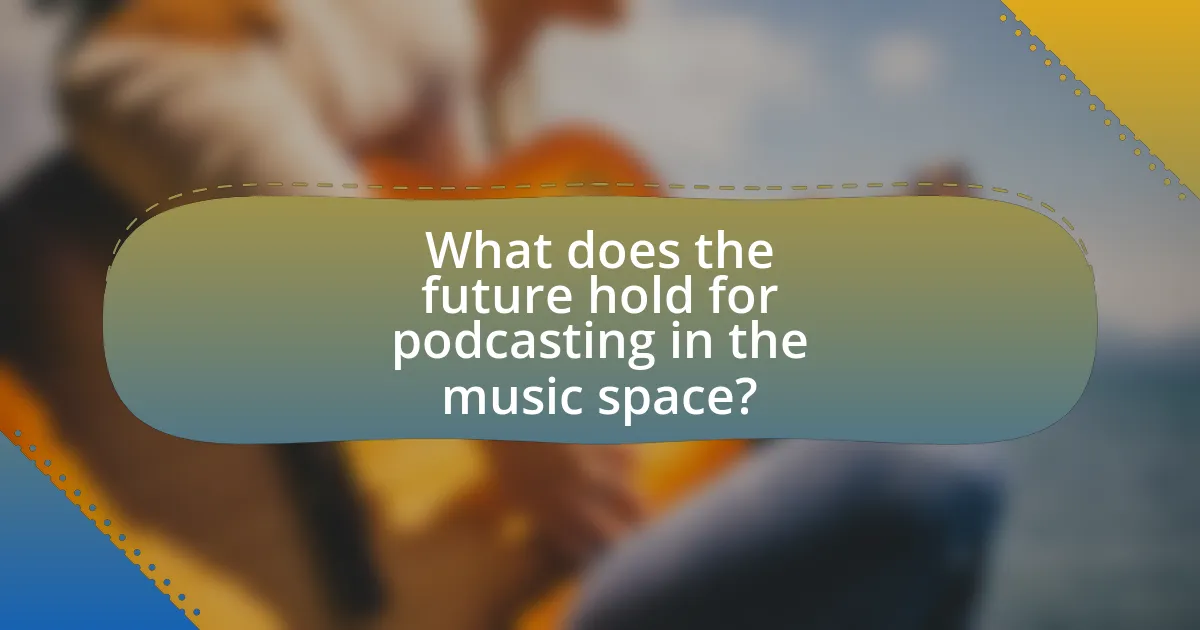
What does the future hold for podcasting in the music space?
The future of podcasting in the music space is poised for significant growth and innovation. As of 2023, the podcasting industry has seen a surge in music-related content, with platforms like Spotify and Apple Podcasts investing heavily in exclusive music podcasts and artist-led shows. This trend is supported by a 2022 report from Edison Research, which indicated that 38% of podcast listeners are interested in music-related content, highlighting a strong audience demand. Additionally, advancements in technology, such as AI-driven music recommendations and interactive podcast formats, are expected to enhance listener engagement and create new monetization opportunities for artists and creators.
How might emerging technologies shape the future of music podcasts?
Emerging technologies will significantly shape the future of music podcasts by enhancing content creation, distribution, and listener engagement. Innovations such as artificial intelligence can automate audio editing and personalize content recommendations, making it easier for creators to produce high-quality podcasts and for listeners to discover new music-related content tailored to their preferences. Additionally, advancements in augmented reality and virtual reality can create immersive listening experiences, allowing audiences to engage with music in a more interactive way. For instance, platforms like Spotify are already experimenting with AI-driven playlists and personalized listening experiences, demonstrating the potential for technology to transform how music podcasts are consumed and enjoyed.
What innovations are on the horizon for audio content delivery?
Innovations on the horizon for audio content delivery include advancements in spatial audio technology, which enhances the listening experience by creating a three-dimensional sound environment. Companies like Apple and Dolby are investing in immersive audio formats that allow listeners to perceive sound from various directions, making podcasts and music more engaging. Additionally, the integration of AI-driven personalization algorithms is set to revolutionize content delivery by tailoring audio recommendations based on user preferences and listening habits, as evidenced by Spotify’s use of machine learning to curate playlists. These innovations aim to improve user engagement and satisfaction in the rapidly evolving audio landscape.
How could artificial intelligence impact music podcasting?
Artificial intelligence could significantly impact music podcasting by enhancing content creation, personalization, and audience engagement. AI algorithms can analyze listener preferences and behaviors, allowing podcasters to tailor their content to specific demographics, thereby increasing listener retention and satisfaction. For instance, platforms like Spotify utilize AI to recommend podcasts based on user listening habits, which has been shown to boost engagement rates. Additionally, AI tools can assist in automating editing processes, improving audio quality, and generating show notes, which streamlines production and allows creators to focus on content quality. This integration of AI in music podcasting not only optimizes the listening experience but also fosters a more dynamic and interactive relationship between creators and their audience.
What best practices should aspiring music podcasters follow?
Aspiring music podcasters should focus on creating high-quality audio content, engaging storytelling, and consistent publishing schedules. High-quality audio is essential because listeners are more likely to stay engaged with clear sound and minimal background noise, which can be achieved through proper equipment and editing techniques. Engaging storytelling captivates the audience, making them more likely to share the podcast and return for future episodes; this can be supported by incorporating personal anecdotes, interviews with artists, and behind-the-scenes insights. Consistent publishing schedules help build a loyal audience, as regularity fosters anticipation and reliability; research indicates that podcasts with a consistent release schedule tend to retain listeners better.
How can podcasters effectively build their audience?
Podcasters can effectively build their audience by consistently producing high-quality content that resonates with their target demographic. Engaging storytelling, expert interviews, and relevant topics attract listeners and encourage them to share episodes. Additionally, leveraging social media platforms for promotion and collaborating with other podcasters or influencers can expand reach. According to a 2021 report by Edison Research, 41% of podcast listeners discover new shows through recommendations from friends or social media, highlighting the importance of these strategies in audience growth.
What tips can enhance the quality and appeal of music podcasts?
To enhance the quality and appeal of music podcasts, creators should focus on high production values, engaging content, and audience interaction. High production values, including clear audio and professional editing, ensure listeners have a pleasant experience, which is crucial as studies show that 85% of listeners prefer well-produced content. Engaging content, such as interviews with artists, behind-the-scenes stories, and curated playlists, keeps the audience interested and encourages sharing. Additionally, fostering audience interaction through social media or live Q&A sessions can build a community around the podcast, increasing listener loyalty and engagement.

